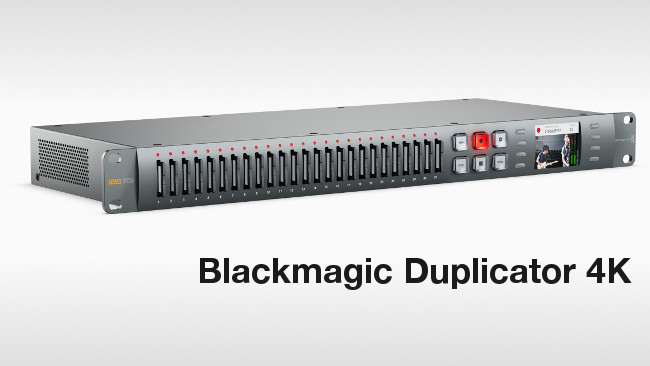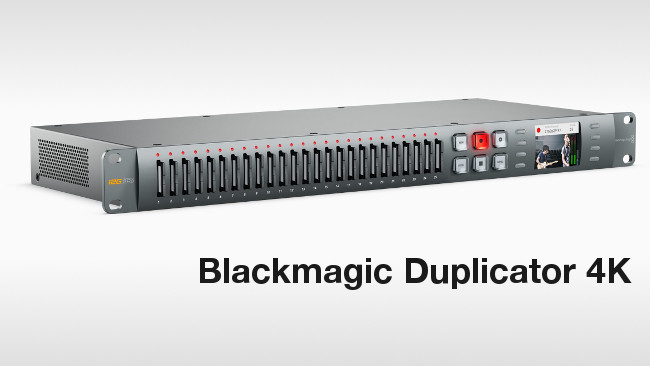
 Blackmagic Duplicator 4K
Blackmagic Duplicator 4K
Peter Haas takes a closer look at one of the sleeper hits of NAB 2016, Blackmagic Design's Duplicator 4K.
"Manufacturers have moved away from regular HD and customers are buying new larger high resolution TVs. But the problem for consumers is that there's very little content available [to] take advantage of the resolution, color and detail that their new televisions can display."
- Grant Petty, CEO, Blackmagic Design.
Going physical
While much of the industry is focused on the cloud and web-streaming distribution, the limitations of bandwidth, storage and access has created a lag in the widespread acceptance of Ultra HD content, despite the number of devices ready to play it.
So, with the announcement of the rack-mountable Duplicator 4K, Blackmagic Design has taken moves to popularize the release of Ultra HD content by reintroducing the idea of physical media distribution, utilizing standard SD cards.
With the simple push of a bright red record button, materials are captured off the multi-rate 12G-SDI connections and recorded to twenty-five standard SD cards in SD, HD, and Ultra HD formats up to 60p via the ultra-efficient H.265 codec.
Key Features
- 25 SD card recorders for simultaneously recording onto multiple cards at once
- Realtime H.265 encoding technology which is the standard for Ultra HD
- 12G-SDI input and loop thru output, along with RS-422 control
- Uses open standard file formats that are compatible with computers and Ultra HD televisions
- Records unlimited cards by daisy chaining multiple duplicators together
- Easy to use front panel controls with lock, record, append, stop, and remote buttons
- Built in universal 110V-240V AC power supply
The device is mostly targeted to live content-creators such as musicians, stage performers, sport events and conferences.
"It gives [content creators] a way to sell content right after a live event, while attendees are still excited about the performance. Now customers can sell concert videos to fans as they leave the venue, to parents afte their children's latest performance or recital, after sporting events, conferences, sales seminars and more." - BMD Press Release
When higher volumes of duplication are required, the device can be daisy-chained via RS422 for an unlimited number of units - meaning the venue and end users can easily scale their productions based on variables such as venue size and ticket sales.
Why it makes sense
Embracing the idea of using SD cards as distribution format is a smart approach for two reasons, particularly if you compare them to the current standard for physical media distribution, the Blu-ray Disc.
SD cards are readily available and cheap; a standalone 25 GB Blu-ray disc with case costs around $7, while an SD card of 16GB can average around $5.
A major advantage is that most people already have the player. Since there's an abundance of devices that have built-in SD card support, consumers aren't being asked to shell out hundreds of dollars for a new player (at most they might have to buy a five dollar SD-to-USB adapter).
Filling an optical disc with 25GB of media can take the better part of an hour of burning, while a device such as the Duplicator 4K can write in realtime.
SD cards are more robust than optical media, which must be handled carefully to prevent dust and scratches, which can quickly ruin a $30 purchase.
And, of course, there is the obvious fact that Blu-ray discs max out at HD recording, while SD cards allow for a flexible future in regards to formats.
At a time when web/cloud technology, while still full of possibilities, is not able to provide the content delivery so many distributors were initially hoping for, the reintroduction of physical delivery media is a potentially brilliant and important step in helping content creators reach their audiences.
The Duplicator 4K is available now from Blackmagic Design with a street price of $1,995.
Tags: Studio & Broadcast


Comments